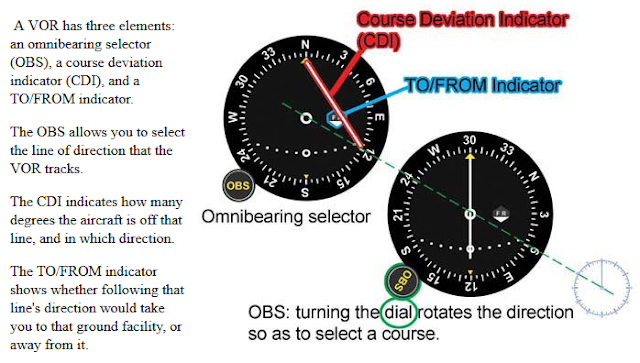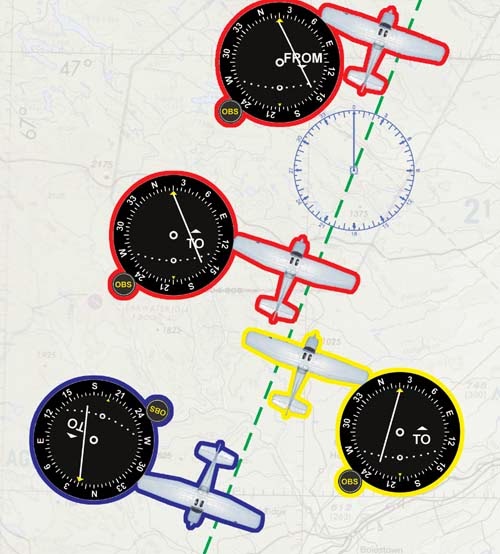VOR Navigation
If you're using the VOR correctly, then the dot in the center is your airplane, and the line is the course you're trying to be on. If the line is to the right, go right. If the line is to the left, go left
1. Centering the CDI
2. The CDI:
If the aircraft is not on the line, the CDI shows
a deviation of one dot for every two degrees. Think of the center
dot as being the aircraft, and the CDI as being the line you
want to be on. If the line is to the right of the dot, get back
on it by turning right (as in the example's red aircraft). IMPORTANT:
if you are flying away from the VOR station, and the indicator
says TO, you will get reverse sensing: the line will be on the
wrong side. This is the situation with the blue aircraft in the
example: if that plane goes right, toward the CDI needle, it
will get farther away from the radial line. The same is true
if you are flying toward the station, and the indicator says
FROM.
 3. Location: To find out
where you are, find two ground facilities that will give you
a good angle between them. Tune each in, and center the needles
with a FROM indication. You are on the intersection of those
two radials. (If you have only one VOR, then you'll have to flip
between their frequencies and recenter.) In this example, the
plane is at the intersection of the RED 074º radial, and
the GRN 157º radial.
3. Location: To find out
where you are, find two ground facilities that will give you
a good angle between them. Tune each in, and center the needles
with a FROM indication. You are on the intersection of those
two radials. (If you have only one VOR, then you'll have to flip
between their frequencies and recenter.) In this example, the
plane is at the intersection of the RED 074º radial, and
the GRN 157º radial.To fly from one VOR to another, fly away from one VOR with the needle centered on the appropriate radial and a FROM indication. You can put exactly the same radial into the VOR you're approaching, and it will also line up with a TO indication. If you have only one VOR, switch between the frequencies at the half way point.
5. Intercepting a radial:
Intercepting a radial is a matter of choosing the angle
at which you wish to get on the line, and then doing some utterly
simple math.
 Bracketing is the craft of getting and staying on a direct
track to a navigation facility, by making adjustments for wind
drift. The idea is this: get on the line and hold a heading.
The wind pushes you off the track. Pick a heading to get back
to the line, and then split the difference. Repeat until you
find the heading that holds the CDI steady, straight up and down.
Bracketing is the craft of getting and staying on a direct
track to a navigation facility, by making adjustments for wind
drift. The idea is this: get on the line and hold a heading.
The wind pushes you off the track. Pick a heading to get back
to the line, and then split the difference. Repeat until you
find the heading that holds the CDI steady, straight up and down.




